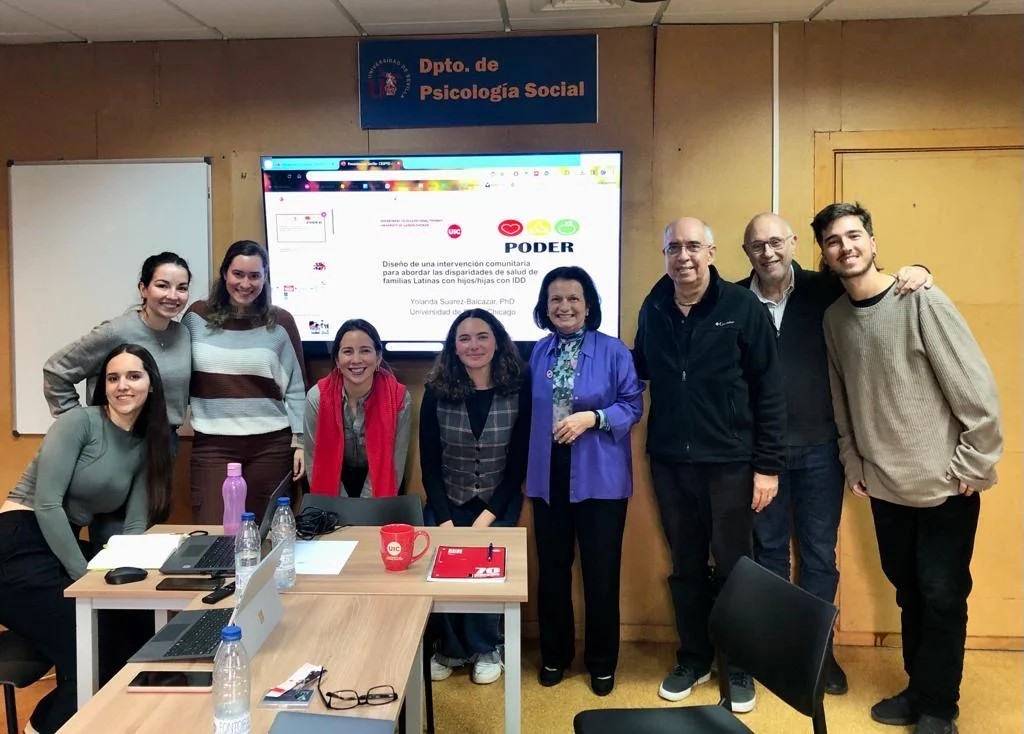AHS professors continue 20-year collaboration with University of Seville
Text

In the summer of 2000, AHS professors Yolanda Suarez-Balcazar and Fabricio Balcazar were invited to the University of Seville to teach a course on community-based participatory research. In the 24 years since, the two have created a strong, reciprocal partnership with their colleagues at the university to empower diverse populations from different geographical and cultural contexts.
Suarez-Balcazar, OT and DHD professor, and Balcazar, DHD professor, returned from their latest two-month appointment as visiting scholars in Seville in March.
“When we visit, whether in Seville or Chicago, we engage in on going mutual learning and community-engaged research. I think it’s a fascinating partnership,” Suarez-Balcazar said.
The couple collaborates with the University of Seville’s Coalition for the Study of Health, Power and Diversity in summer workshops, research projects, co-direction of doctoral theses and joint publications with Spanish scholars. Their latest shared publication, Promoting Justice through Community-Based Research: International Case Studies, published in the American Journal of Community Psychology, is a widely cited model for supporting different communities in creating change from the ground up.
Suarez-Balcazar, OT department head from 2006 to 2022, was named a University Scholar by the UI Office of the President in 2022. She is co-principal investigator on the PODER project: a federal grant promoting healthy lifestyles among Latinx children with intellectual and developmental disabilities and their families. Balcazar is principal investigator of the Entrepreneurship for Youth with Disabilities, an initiative funded by the National Institute on Disability Independent Living and Rehabilitation Research to promote self-employment among youth with disabilities. He was also named a University Scholar in 2020.
During their latest visit to Seville, Suarez-Balcazar and Balcazar adapted the methodologies they’ve developed throughout the years to several new programs, especially those focused on the Roma community.
One program, the ANDAROMI initiative, is a three-year project supporting Roma women’s advocacy for gender equity and reproductive rights.
Suarez-Balcazar and her colleagues in Seville also conducted a community-engaged asset mapping with Roma teen girls to identify resources in the community that would help them pursue their goals. She and her colleagues developed the asset mapping methodology in 2018 in Chicago, working with Latina mothers of children with intellectual and developmental disabilities. At the time, a graduate student from the University of Seville, Daniela Eugenia Miranda, traveled to Chicago to help with the research and learn the methodology. Miranda is now a post-doctoral research fellow at University of Seville, coordinating ANDAROMI and other community-based participatory research initiatives.
“It’s an interesting challenge that we face as applied researchers,” said Suarez-Balcazar. “How do we modify or adapt a framework or methodology for a different cultural group?”
Suarez-Balcazar and the PODER team developed a model for culturally tailoring community interventions to diverse populations.
Balcazar brought his expertise in disability studies to the coalition’s goal of empowering specific groups in Andalusia. He presented the curriculum of his youth entrepreneurship project, which will be translated into Spanish and adapted to the Roma community.
Future plans for the partnership are already in motion. A psychology graduate student from the University of Seville will visit UIC in August for three months to assist Balcazar with translating the youth self-employment curriculum and participate in research projects with both UIC professors. These exchanges are beneficial for both faculty and students across disciplines.
“Given our different disciplinary affiliations — occupational therapy, disability studies, community psychology — we’ve been able to optimize our research on social problems using an interdisciplinary lens,” said Suarez-Balcazar.
No matter the specific methodology or area of study, the core aims of the collaboration remain the same.
“The focus is always on promoting advocacy and empowerment among groups experiencing oppression” she said.